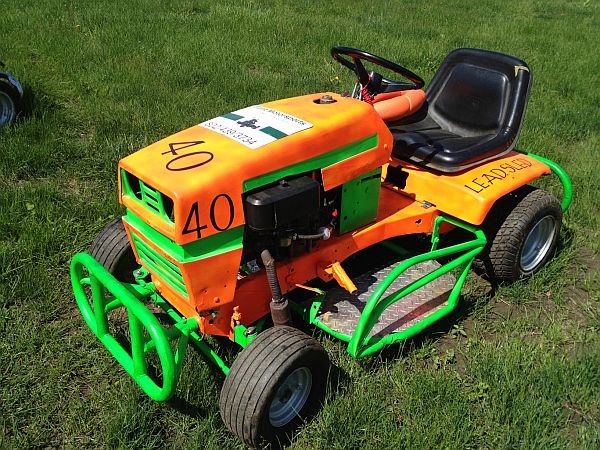 Racing season got underway over the weekend at the Connecticut Valley Fair Grounds in Bradford. But we’re not talking cars. Or horses.
Racing season got underway over the weekend at the Connecticut Valley Fair Grounds in Bradford. But we’re not talking cars. Or horses.
We’re talking lawnmowers. The kind you ride.
You could call Practicing about a week before yesterday’s season opener, Paul and Tracy Flint, their sons Derek and Steven, and their buddy Will Ordway, the royal family of lawnmower racing in Bradford. With a few friends, they work hard all summer long maintaining the track, scheduling Sunday races, finding sponsors, and writing and enforcing rules. They also walk off with a lot of the trophies. But they don’t want to be called royalty. They want to be called rednecks. In fact, that’s what they call their club – Redneck Lawnmower Racing.
On a recent Saturday, before the race season got off to an official start, they pulled a trailer up to the fenced-in circular track they’ve helped build, and dragged out their four ride-on mowers. Ordway’s is emblazoned with his racing nickname.
"My real name’s Will. They gave me the nickname of ‘Dynamite’ because I don’t break stuff, I blow it up," he explains. "I blew up a motor and a transmission in one night, and Paul gave me that nickname."
His friend Steve Flint adds, "We’re a bunch of rednecks doing what we want to do. Can’t afford race cars, can afford race tractors."
But that doesn’t mean souping up a ride-on mower to go 65 miles an hour comes cheap. Paul Flint says a basic model runs about three hundred bucks. B, but better engine components, bumpers, and roll bars can add another three thousand dollars.
"We don’t go to finish second," he says, helping his son push the tractor to the track for a practice run. "Second is the first loser and we don’t want to be that way. So that’s why we keep putting money into them, till we get where we want to go."
And they put in hours and hours of tinkering time at home, Tracy Flint explains.
"It keeps the family together. The boys always have something in common to do. It keeps them out of the house. They’re in the shop till late at night working, just like you’d work on a race car. They’re up till midnight before the races. During the week we come down here at the fairgrounds doing the maintenance here, also."
And they also practice a lot.
There have been a few broken bones, and at least one ambulance ride to the hospital from this track. But as the twenty-something boys try out the course, Tracy and Paul look on. Tracy is bracing for another season where riders are sure to challenge her scoring, and try to get around rules about how the tractors are built and driven. Paul says accidents aren’t as common as they used to be.
"Very few tractors roll over any more because everyone’s making them better," he says. "They’re tightening up their steering, they’re taking out tractor components and putting in better components and that’s the difference. And we hope that most of them are getting better at their driving and using a little bit of common sense. Everyone has to leave here on Sunday afternoon and go to work on Monday."
But if you think these guys are going to go back to mowing the lawn, think again. In the Flint household, at least, that’s Tracy’s job. The men, she says, are too busy racing.